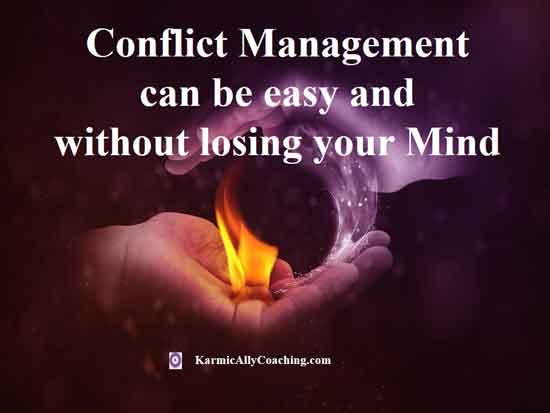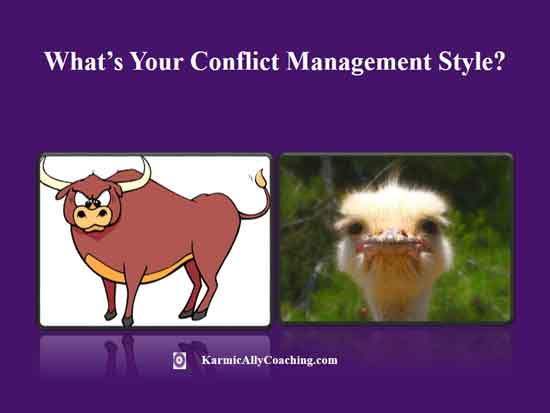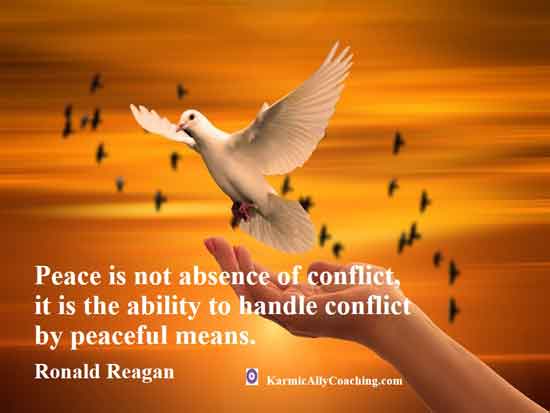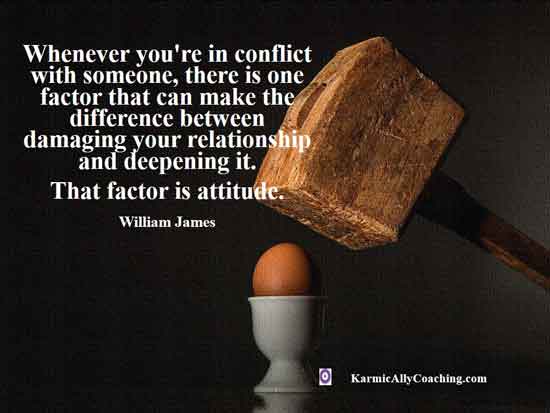
Conflict resolution is an important skill both in the workplace as well as in one’s personal life. But it’s not an easy skill to master because our emotions get in the way.
One of the biggest challenges I’ve faced as a Team Leader and Manager was bringing the different members of my audit teams to work as one and not a group of individuals brought together for an assignment.
One had to manage the project close, the goals of each individuals and ensure they worked as a group while managing personality and working styles.
When professionals are from different disciplines, this is normal and it’s up to the leader to manage the clash of personalities and even egos sometimes.
Even then, there were times when conflicts arose and had to be handled with tact and understanding.
Sometimes the conflict can be with the boss as I narrate in my post Dealing with Ethical Dilemmas can be Easy and the steps to take if you’re in that situation.
Be honest, how do you feel about confrontation?
Have you ever had a difficult confrontation that made you wonder at the end of it, that you were going bonkers or wee bit mad?
Does the thought of confronting someone at home or work leave you feeling anxious or depressed?
Are you the kind of person who actively goes out of your way to avoid conflict, even when doing so makes your life more difficult?
Maybe you’re the kind of person who is ready to charge into the arena like a bull agitated by the Matador and take the conflict issue head on.
Or you make every effort to avoid conflict and bury your head in the sand like an ostrich.
Either way it’s an uncomfortable situation and the solution is nonviable in the long run.

For most of us, the idea of confronting someone about a problem we have is enough to trigger a flood of feelings.
And when you imagine yourself sitting across from that person, talking about something that has been bothering you or causing you pain, you can’t help but get emotional just thinking about it.
You don’t want to get emotional in front of them, but you can’t see a way to resolve your problem without confronting the situation.
The non-resolution of the conflict exacerbates into higher stress levels and ultimately your health and work performance.
Sadly, most of us were not given a great model for this or taught these skills in school. Many of us have learned to avoid conflict or become passive and hope it will go away.
Sometimes it becomes even more difficult because the other person is toxic and simply baiting you to bring out the worst in you.
So, what are you to do?
The good news is, confrontation and conflict don’t have to result in anguish or late nights wondering what YOU did wrong.
Whether your conflict is professional or personal, learning how to resolve these problems successfully is an important skill to have. You need to know how to apply emotional intelligence in the workplace.
When you can do it properly, you’ll feel good about the resolution, and you will finally stop tossing and turning at night. Here’s how.
3 Steps to resolve conflict without a headache
Get Mentally Prepared for the Conflict Situation
Before confronting someone, be sure you thoroughly evaluate what you believe the problem to be, how it makes you feel, and the specific issue you think needs to be addressed.
Be sure to focus on the problem at hand, NOT the emotions, concerns, or other factors that may be related but are not relevant to this discussion.
Prepare for your specific conversation, including how you will respond to their likely retorts or justifications.
The more prepared you are, the better you think and manage your emotions in the moment.
What is it that this person really cares about? What is their perspective on this issue?
Trying to understand their point of view using Perceptual Positions helps you be better prepared with your counterpoints.
What is your ideal solution, and how can you make that work for them?

Another suggestion is to do role play.
Role-playing with someone can help you prepare and figure out where your emotional triggers might be.
Get feedback from others about how to approach the situation or respond to their arguments.
Remember you are there to talk about the specific situation, not the other person.
This is about resolving the problem to protect your relationship, not to destroy them.
Create a Productive Engagement
I go into more detail in my course Detox Your Toxic Workplace but in essence, here’s how you create an ambiance where both parties can engage in constructive dialogue.
Talk with the other person in private or another safe environment rather than in front of other people.
Remember to focus on the positives so that you can build from there and stay firm on your need to address the problem you are having.
Speak in facts, not emotions, and then allow the other person to respond.
Allow them to express their point of view and genuinely listen to what they are saying.
Focus on your needs and feelings without bringing others into the mix.
If you bring up how others feel, it will make them feel attacked and judged, and it makes you look weak that you need their support to justify your claims.
Remain calm, focus on the real issue, and do your best to explore solutions and possibilities, even if they are different from your own.
Come prepared with support, facts, and data that back up your claim to what you believe you are entitled to from this outcome.
Be confident that you are asking for what you deserve or need.
Stay Focused on the Issue
Throughout your conversation, don’t take anything personally. It will be tough but stick to the agenda of the conversation – the issue.
You are there to resolve a problem, not to feel better about yourself. This is not about you. This is about addressing the issue.
Do not use inflammatory language, and use “I” statements to focus on how this situation is affecting you.
Avoid absolute language (never, always), as well. Assume that the other person has positive intentions and would like to see this situation resolved, as well, and you may find you get a better result.
It’s okay if the outcome that you agree upon is not your idea, as long as it is something you can live with.

Focus on finding solutions that give you both what you need and want and discuss the pros and cons of any resolution together before making an agreement.
Agree what each of you will do to resolve the problem and set a time to meet again soon to check in on your progress.
Be sure you follow through with your end of the deal, as well. You are one-half of this relationship, so do your part to solve this problem, too.
Bonus Tip: Confront and Banish Your Fears and Weaknesses
You may be scared of what outcome will emerge by taking the above approach to conflict resolution. Fear in dealing with such situations is normal. While you can’t control the outcome completely, you can control your Inner Feelings.
My suggestion, whether metaphysical or not is always to confront the fear or weakness by acknowledging it, analyzing it and then letting it go. The letting go part is the difficult one just as breaking a bad habit.
This Confrontation Technique will give you the confidence you need to do the right thing.
Final Words on Conflict Resolution
You do not have to choose between staying in control of your emotions or finding a resolution to your conflicts. You can have both.
You just need to learn to manage your feelings more effectively while asking for what you need.
I know I’m not alone in dealing with conflict and I chose to have both. Do you?
Imagine how knowing how to manage conflict will reduce your stress levels.
Setting clear boundaries and mutual expectations can help us avoid most conflict. It also helps us build relationships based on trust.
So many professionals have asked me about managing their emotions when dealing with conflicts.
And I’ve seen so many make the mistake of internalizing their feelings without addressing the issue at hand and then let it fester until there is an outburst. And that’s just backwards.
So I’ve put together a report for free that would help professionals like you, learn a few techniques to focus on the right things during conflict resolution so that you get what you need without losing your cool.
Conflict management skills are a lifetime practice.
It may still feel uncomfortable and stressful when conflict arises but using this short report will increase your confidence having tough conversations and respond well.
Any of the items in the report can provide valuable insights, even if you only do one.
Would this be of interest to you?
Click here or on the image below and get your copy now.




 I adhere to the Certified Coaches Alliance Code of Ethics and Standards. A copy is available on request.
I adhere to the Certified Coaches Alliance Code of Ethics and Standards. A copy is available on request.
 Let's Talk through the Connect Form:
Let's Talk through the Connect Form: